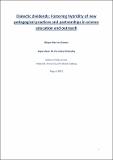| dc.contributor.advisor | McCauley, Veronica | |
| dc.contributor.author | Martins Gomes, Diogo | |
| dc.date.accessioned | 2015-09-07T11:08:05Z | |
| dc.date.issued | 2015-09-02 | |
| dc.identifier.uri | http://hdl.handle.net/10379/5202 | |
| dc.description.abstract | Internationally, science literacy has become socially and economically very important. Many European countries, including Ireland, stress that science and technology graduates are fundamental for economic growth. Nevertheless, there is a recognized trend of diminishing interest in science by students. In response, there has been a call to change the way science is taught in schools which focuses on inquiry methods rooted in constructivism, and for further encouragement of students to pursue science degrees. Specifically at primary level, there is a recurrent view that teachers lack the confidence and pedagogical knowledge to teach science by inquiry. Universities and other organizations have responded by developing science outreach programmes to improve student engagement in science, and to promote inquiry in the classroom. Given this context, there is a necessity for research in this area to ascertain if this new relationship between outreach and education is worthwhile, and therefore the analysis and comparison of both fields warranted.
This study examines and compares primary teachers' and outreach practitioners' understanding and perceptions of constructivist science pedagogy in an effort to understand the potential of the teacher-outreach symbiotic partnership. A mixed-methods approach was employed. The Constructivist Learning Environment Survey was completed by 149 teachers and 89 outreach practitioners and semi-structured interviews, presenting constructivist dilemmatic cases were carried out with 31 teachers and 30 outreach practitioners.
The results obtained contradict the view that teachers do not have a strong science pedagogical sense, and are resistant to constructivist approaches. Both teachers and outreach providers revealed favourable views in relation to constructivism, despite recognizing barriers to its implementation. These results move the mind-set away from one that assumes the teacher lacks this pedagogical knowledge towards one that supports the teacher-outreach symbiotic partnership and the realisation of the hybrid role of each participants. The results obtained have also revealed an important gatekeeper dynamic in outreach access to schools. The study ends with implications and recommendations derived from these conclusions. | en_US |
| dc.rights | Attribution-NonCommercial-NoDerivs 3.0 Ireland | |
| dc.rights.uri | https://creativecommons.org/licenses/by-nc-nd/3.0/ie/ | |
| dc.subject | Science education outreach | en_US |
| dc.subject | Dialectic constructivism inquiry | en_US |
| dc.subject | Education | en_US |
| dc.title | Dialectical dividends: fostering hybridity of new pedagogical practices and partnerships in science education and outreach | en_US |
| dc.type | Thesis | en_US |
| dc.contributor.funder | Fundação da Ciência e Teconologia, Portugal | en_US |
| dc.local.note | This thesis relates to teachers and science outreach practitioners perception of constructivist teaching and learning in their hybrid practice. | en_US |
| dc.description.embargo | 2019-09-01 | |
| dc.local.final | Yes | en_US |
| nui.item.downloads | 414 | |


